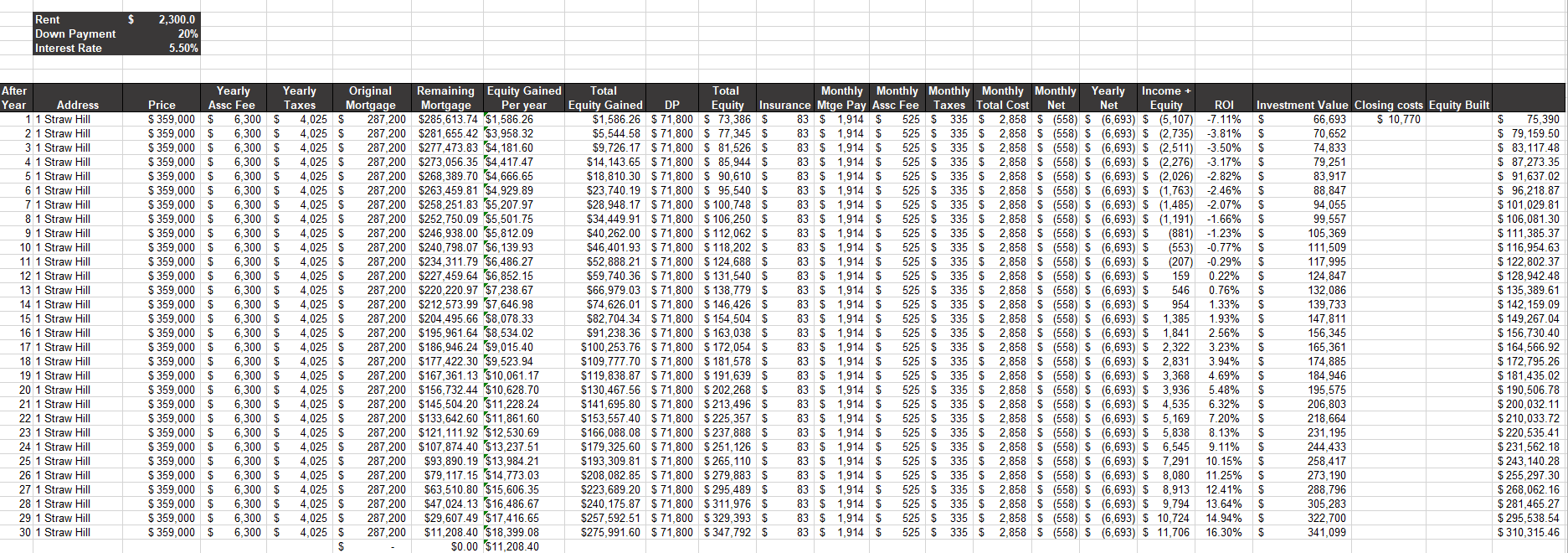Is a Rental Property the Best Way to Grow Your Wealth?
A rental real estate investment can seem like a great way to build your wealth (and maybe generate a little extra income), but how often does it really work out that way?


Profit and prosper with the best of Kiplinger's advice on investing, taxes, retirement, personal finance and much more. Delivered daily. Enter your email in the box and click Sign Me Up.
You are now subscribed
Your newsletter sign-up was successful
Want to add more newsletters?

Delivered daily
Kiplinger Today
Profit and prosper with the best of Kiplinger's advice on investing, taxes, retirement, personal finance and much more delivered daily. Smart money moves start here.

Sent five days a week
Kiplinger A Step Ahead
Get practical help to make better financial decisions in your everyday life, from spending to savings on top deals.

Delivered daily
Kiplinger Closing Bell
Get today's biggest financial and investing headlines delivered to your inbox every day the U.S. stock market is open.

Sent twice a week
Kiplinger Adviser Intel
Financial pros across the country share best practices and fresh tactics to preserve and grow your wealth.

Delivered weekly
Kiplinger Tax Tips
Trim your federal and state tax bills with practical tax-planning and tax-cutting strategies.

Sent twice a week
Kiplinger Retirement Tips
Your twice-a-week guide to planning and enjoying a financially secure and richly rewarding retirement

Sent bimonthly.
Kiplinger Adviser Angle
Insights for advisers, wealth managers and other financial professionals.

Sent twice a week
Kiplinger Investing Weekly
Your twice-a-week roundup of promising stocks, funds, companies and industries you should consider, ones you should avoid, and why.

Sent weekly for six weeks
Kiplinger Invest for Retirement
Your step-by-step six-part series on how to invest for retirement, from devising a successful strategy to exactly which investments to choose.
Owning a rental property in addition to your primary residence can be a way for you to build wealth, especially if you may be averse to investing in the stock market. Data released in 2017 shows that 47% of rentals were owned by individual investors. In theory, it seems to make sense. With a rental property, someone else pays your mortgage, and over time your equity grows. You can eventually own a physical piece of property outright that also produces income. However, rental property investments aren’t always a sure thing.
The first home my wife and I bought was a condo in 2004 in Stamford, Conn., which we then in turn rented out when we bought our first single-family home. Our situation didn’t work out for a number of reasons, mainly because 1) the property, after a rising as high as 30%+ over our purchase price, ended up selling for only a 5% gain. 2) We needed to make updates (kitchen countertops and floors) and repairs (HVAC system) that ate away at our profit. 3) With the great recession rental prices dropped and lowered my expected return, and we also had a few months where the property was empty.
So, as you can see, things that seem too good to be true often are. So, before you decide to invest in a rental property, consider calculating the return on your investment to see if investing in a rental property is really the deal you thought.
From just $107.88 $24.99 for Kiplinger Personal Finance
Become a smarter, better informed investor. Subscribe from just $107.88 $24.99, plus get up to 4 Special Issues

Sign up for Kiplinger’s Free Newsletters
Profit and prosper with the best of expert advice on investing, taxes, retirement, personal finance and more - straight to your e-mail.
Profit and prosper with the best of expert advice - straight to your e-mail.
How to Calculate the Return on Investment of a Rental Property
Like any investment, you need to understand the expected return on investment (ROI). ROI = (Net Profit/Cost of Investment) x 100. Therefore, before you purchase a rental property, ask what return is reasonable to expect on your money, and what do you need to earn in order for the investment to be worthwhile?
Calculating the ROI of a rental property can be complex. While there are many different ways to do this, the point of this exercise is to provide you with a “back of the envelope” calculation to help you quickly assess whether or not a rental property has a return potential that is worth pursuing. If your calculation reveals that the return is small on paper, it’s likely going to be small in reality, too.
Before you can calculate the true ROI of a rental property, you have to factor in all the costs associated with holding that property, not just the purchase amount.
For illustrative purposes, I’ve put together a rental property ROI calculation to demonstrate how complex this mathematical exercise actually is.

What to Factor into a Rental Property ROI Calculation
While the initial cost of investment should be straightforward (purchase price, closing costs, renovations to get it ready), determining your net profit (revenue — expenses) can get tricky. When calculating your own net profit, don’t forget these variables:
Revenue
- Rental Income: How much you can charge for rent each month.
- Mortgage paid down: How much of the property you own.
- Change in property value: How much additional equity you have beyond the amount of the mortgage you have already paid down, based on current housing and rental market prices.
Expenses
- Financing: If you didn’t buy the property with cash and took out a mortgage, the amount you pay per month in principal and interest.
- Homeowner’s association dues: Fees you pay for community amenities.
- Property insurance: The insurance you carry on your property.
- Property taxes: What you pay in state and local taxes. And remember, property taxes don’t typically stay the same each year. They typically continue to rise unless an economic downturn allows you to have the property reassessed (typically for a fee) and readjusted downward.
- Vacancy: The amount of cash you need to cover expenses when you don’t have a tenant. The standard vacancy rate is 5% to 8%, meaning that’s the percentage of the year that the property can be expected to sit empty.
- Your time: The one item many people forget to account for is the cost of their own time. Whether it’s time spent as the handyman or finding a renter, your time is money, and anytime you put into managing the property reduces the return on your investment.
My “back of the envelope” calculation doesn’t even account for any management or maintenance costs of the property. Properties always require maintenance. This number is hard to generalize, as every property is different, but just know that something will break, appliances will need to be upgraded, and ongoing resources will be required to keep your property maintained and competitive in the rental market.
In addition, this calculation should be done for every year you anticipate owning the property, as your return will change over time.
Conclusion
Rental properties can generate income, but the return on investment doesn’t typically happen right away. Rental property investments are also risky because of how many variables can affect its performance, like the housing market or your ability to keep it rented. So, if you are wondering if you should invest in real estate, really consider how appropriate this type of investment would be for you and your situation first.
As with any investment, rental properties should be viewed as a long-term investment, not an instant cash cow. If your goal is to grow wealth, I will tell you that there are other ways to generate a return on your income with less risk and headache, like investing in a globally diversified portfolio of stocks and bonds.
What has been your experience with rental properties and being a landlord? Do you agree that, as an investment, it takes a while to reap a reward, or has your experience been different? Write to me at paul@lakeroadadvisors.com and tell me about it!
Profit and prosper with the best of Kiplinger's advice on investing, taxes, retirement, personal finance and much more. Delivered daily. Enter your email in the box and click Sign Me Up.

Paul Sydlansky, founder of Lake Road Advisors LLC, has worked in the financial services industry for over 20 years. Prior to founding Lake Road Advisors, Paul worked as relationship manager for a Registered Investment Adviser. Previously, Paul worked at Morgan Stanley in New York City for 13 years. Paul is a CERTIFIED FINANCIAL PLANNER™ and a member of the National Association of Personal Financial Advisors (NAPFA) and the XY Planning Network (XYPN).
-
 Here’s How to Stream the Super Bowl for Less
Here’s How to Stream the Super Bowl for LessWe'll show you the least expensive ways to stream football's biggest event.
-
 The Cost of Leaving Your Money in a Low-Rate Account
The Cost of Leaving Your Money in a Low-Rate AccountWhy parking your cash in low-yield accounts could be costing you, and smarter alternatives that preserve liquidity while boosting returns.
-
 I want to sell our beach house to retire now, but my wife wants to keep it.
I want to sell our beach house to retire now, but my wife wants to keep it.I want to sell the $610K vacation home and retire now, but my wife envisions a beach retirement in 8 years. We asked financial advisers to weigh in.
-
 How to Add a Pet Trust to Your Estate Plan: Don't Leave Your Best Friend to Chance
How to Add a Pet Trust to Your Estate Plan: Don't Leave Your Best Friend to ChanceAdding a pet trust to your estate plan can ensure your pets are properly looked after when you're no longer able to care for them. This is how to go about it.
-
 Want to Avoid Leaving Chaos in Your Wake? Don't Leave Behind an Outdated Estate Plan
Want to Avoid Leaving Chaos in Your Wake? Don't Leave Behind an Outdated Estate PlanAn outdated or incomplete estate plan could cause confusion for those handling your affairs at a difficult time. This guide highlights what to update and when.
-
 I'm a Financial Adviser: This Is Why I Became an Advocate for Fee-Only Financial Advice
I'm a Financial Adviser: This Is Why I Became an Advocate for Fee-Only Financial AdviceCan financial advisers who earn commissions on product sales give clients the best advice? For one professional, changing track was the clear choice.
-
 I Met With 100-Plus Advisers to Develop This Road Map for Adopting AI
I Met With 100-Plus Advisers to Develop This Road Map for Adopting AIFor financial advisers eager to embrace AI but unsure where to start, this road map will help you integrate the right tools and safeguards into your work.
-
 The Referral Revolution: How to Grow Your Business With Trust
The Referral Revolution: How to Grow Your Business With TrustYou can attract ideal clients by focusing on value and leveraging your current relationships to create a referral-based practice.
-
 This Is How You Can Land a Job You'll Love
This Is How You Can Land a Job You'll Love"Work How You Are Wired" leads job seekers on a journey of self-discovery that could help them snag the job of their dreams.
-
 65 or Older? Cut Your Tax Bill Before the Clock Runs Out
65 or Older? Cut Your Tax Bill Before the Clock Runs OutThanks to the OBBBA, you may be able to trim your tax bill by as much as $14,000. But you'll need to act soon, as not all of the provisions are permanent.
-
 The Key to a Successful Transition When Selling Your Business: Start the Process Sooner Than You Think You Need To
The Key to a Successful Transition When Selling Your Business: Start the Process Sooner Than You Think You Need ToWay before selling your business, you can align tax strategy, estate planning, family priorities and investment decisions to create flexibility.